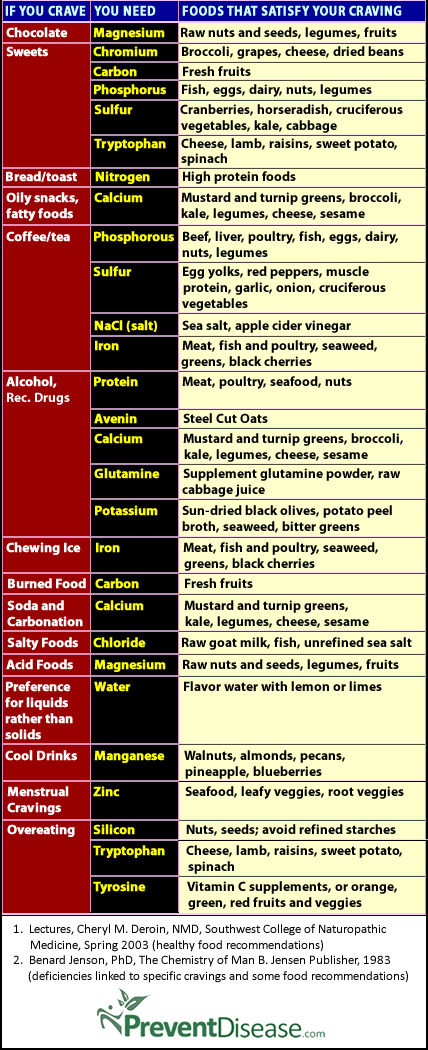HJ: While you might not know the specific nutrient makeup of the foods you eat, your body absolutely does. Beyond speaking to the incredible, innate intelligence of our cells and physical being, this ‘food memory’ serves an important purpose. For this reason, it is imperative that you learn to listen to your body.
Your body uses cravings for specific foods to make sure its nutritional needs are met. When you eat a specific food, it imprints your body with a nutritional map of that foods unique nutrient makeup. When your body needs a particular nutrient, it consults this nutritional food map to determine which foods would supply the given nutrients it needs. This is a perfect system in and of itself except that we let our logical, reasoning mind get in the way far too often. For example, your body might be craving the exact nutritional elements that are contained in cheese. However, if you have been indoctrinated to believe cheese is bad or saturated fat is bad, or that cheese makes you fat, or perhaps you are a vegan… you get the idea… then you may repress or ignore this food craving and inadvertently be denying your body what it most desperately needs. I used cheese as an example because it is in many ways a ‘demonized’ food, but this could easily apply to any food.
Even beyond this, we might mistake our cravings or develop maladaptive responses. For example, if our body is running low on the raw materials to manufacture serotonin, we might crave sweets because the body knows that this creates a surge of serotonin in the body. However, it does not address the underlying problem, but is merely a band aid for the larger nutrient deficiency. In these cases we need to retrain our body by learning which foods to substitute to get the same effects. In time, our bodies will begin craving the new, healthier foods. This is the primary objective of the article below — to help you learn to understand what your body’s food cravings really mean and switch them over to foods which are not so detrimental, in certain terms, to your health.
– Truth
All Foods That You Crave Are Driven By A Lack of Specific Nutrients – So Which Foods Will Address Your Craving and Why?
By Natasha Longo | Prevent Disease
—
Once we become aware of the foods that do not agree with our biochemistry, hormonal balance and digestion, we can rectify and tweak our diet to satisfy something larger that our body needs. Severe cravings can lead to binge eating and other eating disorders. If we know exactly why we crave a specific food, we can match the nutrient deficiency to a healthy bioavailable source that can perfectly address all our cravings and leave us satiated all year round.
When you hear your tummy growling or you get this “urge,” the problem is deciding whether you’re craving a food for emotional or physiological reasons or whether your body is truly hungry for food it needs.
However, many dieters think of food cravings as a weakness, but 91 percent of participants in a calorie-restriction study experienced food cravings at the start. And even more had cravings six months after dieting, nutritionists at Boston’s Tufts University say.
In fact, accepting food cravings and keeping them in check may be an important component of weight management, explains Susan Roberts, an energy metabolism expert at the university’s Human Nutrition Research Center.
Allowing yourself to have the foods you crave, but matching those cravings to healthy sources, may be one of the most important keys to successful weight control. Some of the most commonly craved foods among are those with high sugar plus fat, such as chocolate, and salty snacks, such as chips and French fries.
For example, a craving for chocolate may signal a need for magnesium, which can be obtained from raw nuts, seeds, legumes and fruits. Cravings for oil snacks and fatty foods may be a sign that you need more calcium from turnip greens, broccoli, kale, and raw cheese.
Women experience greater sense of cravings than men and are more frequently on diets or restricting their diets. They also have more unstable weight, feel more frequently too heavy and want more frequently to lose weight.
Mood is also related to food cravings but in a different way according to gender. A majority of female cravers experienced a more (depressed) mood state during the day, and a negative mood–such as annoyance, boredom, and depression–preceded the craving episodes. In contrast, men more commonly indulged in food craving in association with a feeling of happiness.
What biological factors may be at play to cause women to crave food more than men do?
“The gender difference observed could be due to a higher degree of weight concern in women. Social pressure for thinness–more pronounced in women–may (cause them to) more frequently restrict their diet and to follow a diet to lose weight. As these practices are associated with food cravings, they could be one explanation,”‘ said Lionel Lafay, from the National Institute of Health and Medical Research in France.
Another possible explanation could be that women experience a different relationship between food and mood. However, the relationships between food and mood are very complex, as is their underlying biological and psychological determination, Lafay noted.
For example, Lafay said, food craving does not appear to be a simple product of the need for calories and energy.
People who report being hungry often crave salty foods more frequently.
Food craving may be related to a ‘desire’ and not to a ‘need’, which indicates a psychological factor requires satisfying. However, for those individuals who have deficiencies in specific nutrients, the following chart summarizes the craving, the nutrient the body requires, and the food sources that effectively satisfy the food craving.
Strong cravings for starchy, sugary foods often go hand in hand with being overweight, chronically tired, feeling blue or other symptoms of ill health. They can be the result of out of whack blood sugar levels, Candida (yeast overgrowth), and adrenal fatigue. These imbalances can potentially cause disease, premature aging, and us to feel far less than our most fabulous selves.
“You crave what you eat, so if you switch what you’re eating, you can weaken your old cravings and strengthen new ones,” says Marcia Pelchat, PhD, of the Monell Center.
Research shows that even after 5 days you will find that your body will yearn for your trigger foods far less, and after two weeks the cravings are nearly gone.
On a physical level, your blood sugar will begin to balance out, so your body won’t be crying out for foods that it falsely thinks will balance things out. On an emotional level, you will know that it is possible to live without those foods, and you will most likely notice some improvement in your wellbeing, which will keep you motivated.
Natasha Longo has a master’s degree in nutrition and is a certified fitness and nutritional counselor. She has consulted on public health policy and procurement in Canada, Australia, Spain, Ireland, England and Germany.















Lai-Lai
February 15, 2015
What about constant cravings for sardines & kippers? Or anything umami in general?